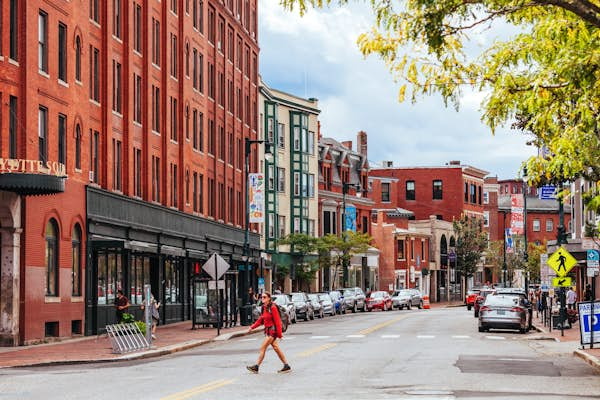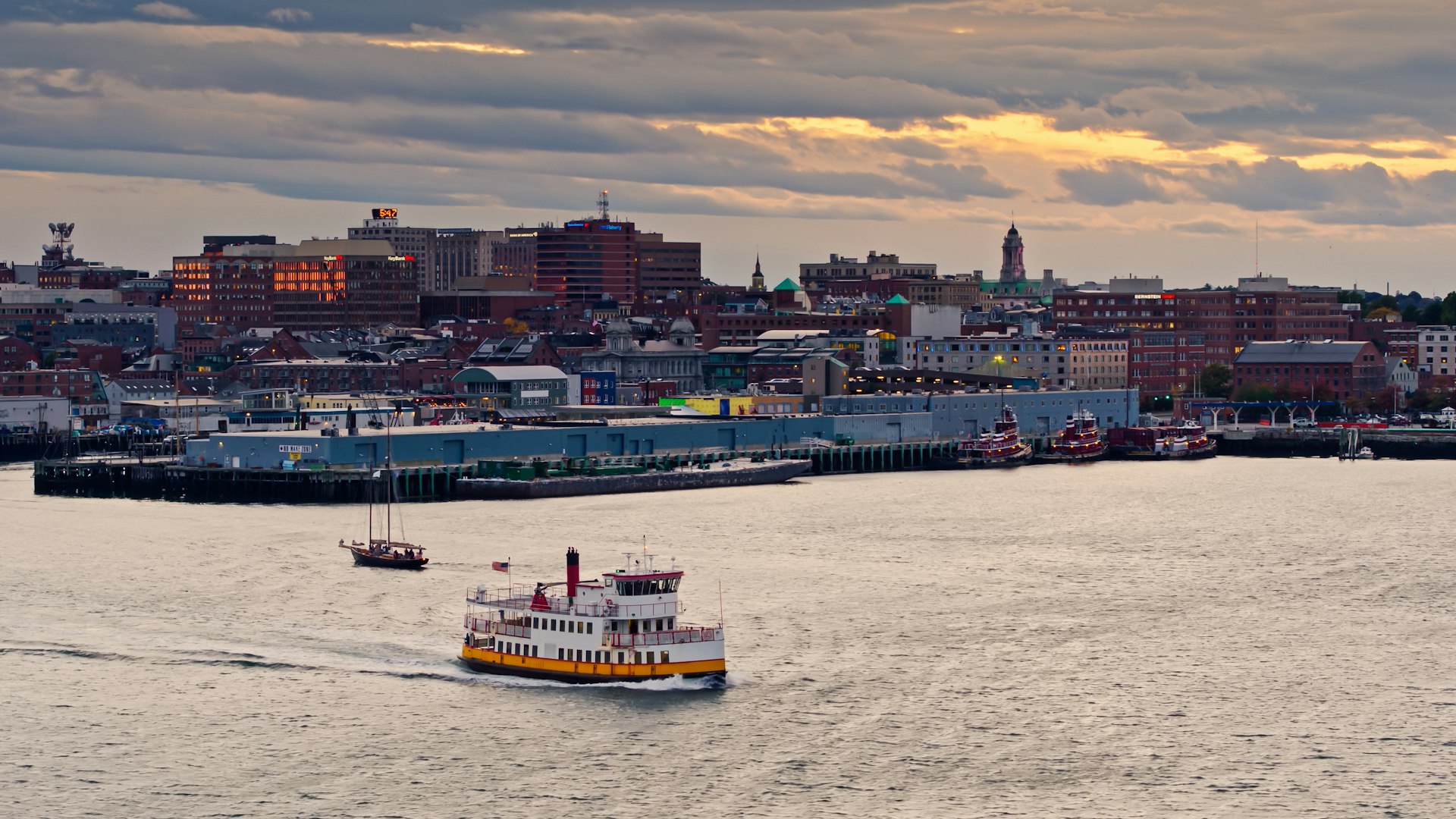
Maine is the largest state in New England by far, with a small population concentrated in the southern third, especially along the stunning coast.
This means much of the state, bordering on New Hampshire to the southwest, the Atlantic Ocean to the southeast and Canada everywhere else, retains a rural beauty that can be hard to fully appreciate without a car – especially outside of the busy summer and fall months, as tourist activity plummets in winter and spring and many services follow suit.
Scout new ways to explore the planet’s wildest places with our weekly newsletter delivered to your inbox.
Getting around by car is relatively easy, thanks to abundant cheap or free parking, the availability of rental cars and major north-south highways like Interstate 95 (I-95) and Rte 1. That said, it’s always easier to appreciate the sights along the way when you’re not in the driver’s seat – and the scenery in Maine will make you want to keep your face pressed to the window.
We can help you take advantage of some decent (if limited) transportation options by bus, train and ferry so you can enjoy some of the top destinations within the state, like Portland and Acadia National Park, without being stuck behind the wheel yourself.
 Explore Portland’s working waterfront on foot © Amy Sparwasser / Getty Images
Explore Portland’s working waterfront on foot © Amy Sparwasser / Getty Images
Bussing and walking: a winning combo
You’re likely to spend some, if not all, of your time in and around Portland, as Maine’s most populous city houses Portland International Jetport (PWM) and the Portland Transportation Center (PTC), the state’s primary hubs for flights and regional trains and buses.
From PWM airport, you can get to downtown Portland with Greater Portland Metro bus route 5; from PTC, route 1. Unfortunately, metro service is limited, so it’s hard to recommend for regular use. Thankfully, the peninsula that encompasses downtown Portland is relatively small and walkable for most, so you can easily explore its working waterfront, boutique shops and art galleries, world-class breweries and transcendent dining scene on foot – or hail a taxi or Uber if something is beyond your reach.
To travel from major cities nearby, like Boston and New York, and to venture north of Portland, look to Concord Coach Lines, a comfortable, reliable and affordable provider of two routes through Southern Maine. Most tourists will want the Midcoast Maine option, as it travels along the astoundingly beautiful coast from Portland to Searsport and just inland to Bangor, stopping at such charming towns as Brunswick (home to Bowdoin College), Rockland and Belfast.
Concord Coach’s inland route is geared in large part toward college students, as it connects Portland to Bangor via points of interest like Lewiston (Bates College), Waterville (Colby College) and Orono (University of Maine). You’ll find full schedules and fares online. Note that while you book a ticket for a specific time, it’s not a reservation, but rather valid for any time within a year of purchase. This system offers flexibility, and we’ve never been bumped because of an overbooked bus.
To reach points further afield, transfer in Bangor. Monday through Friday, for example, Downeast Transportation connects the Concord Coach terminal in Bangor with Bar Harbor, a neighbor to New England’s only national park, Acadia National Park, on Mount Desert Island. Via the free Island Explorer bus, you can explore other towns on the island, get to the park and reach Hancock County Bar Harbor Airport.
Daily service by CYR Bus Lines extends north another four hours or so to Caribou, near part of the Canadian border.
Take a train to admire Maine’s beautiful coastline
Amtrak’s Downeaster is Maine’s only passenger-train service, running through New Hampshire to Boston and stopping at just a handful of appealing towns along a scenic coastal route in Southern Maine: Wells, Saco, Old Orchard Beach, Portland, Freeport and Brunswick.
The free Shoreliner Explorer bus connects Wells with additional popular waterfront towns, like Kennebunk, while Freeport is famously the home of LL Bean and many other retail outlets. Old Orchard Beach, which has a boardwalk with nostalgic vibes, is a seasonal stop from May to October.
 Many of Maine’s islands are reachable by ferry © halbergman / Getty Images / iStockphoto
Many of Maine’s islands are reachable by ferry © halbergman / Getty Images / iStockphoto
You can’t beat the views from a ferry
The coast of Maine is 3500 miles long and boasts thousands of islands, many of which are home to small year-round fishing and lobstering communities and seasonal enclaves, meaning you’ll absolutely want to take a ferry to at least one or two of them.
From Portland, Casco Bay Lines runs many standard and specialty trips each day to seven islands, including Peaks Island and Chebeague Island, which have some great inns and restaurants. You don’t need a car to enjoy most of these spots, but you can buy a vehicle ticket.
If you’re primarily interested in riding the waves for sightseeing, try the round-trip mailboat run, which actually carries mail and freight as well as passengers to the islands over the course of a few hours. Keep an eye out for seals, terns, and other seabirds.
Further up the coast, you can visit Monhegan Island, a roughly square-mile gem known for its art scene and near-absence of cars, from places like Boothbay Harbor (Balmy Days Cruises) or Port Clyde (Monhegan Boat Line), or ride the Maine State Ferry Service, which joins towns like Rockland with remote islands like North Haven and Vinalhaven. Keep an eye out for whales and puffins along the way, though you’ll want to book specific cruises to ensure those kinds of sightings.
Most airlines only fly out of state
Maine has several airports, but aside from Portland International Jetport (PWM), they’re primarily tiny affairs that connect only to bigger East Coast cities rather than other in-state airports; in fact, many only offer private charter flights. In general, you’re better off taking the bus or renting a car if you want a direct connection when you’re in Maine.
Accessible travel in Maine
All the primary forms of transportation and most of the providers covered here, as well as many of Maine’s top attractions, are relatively accessible to people living with a disability, including wheelchair users. Be aware, though, that even cosmopolitan Portland can be challenging to navigate on foot or rolling, as its streets are hilly and often lined with cobblestones. For more information, see Lonely Planet’s Accessible Travel Resources page.



